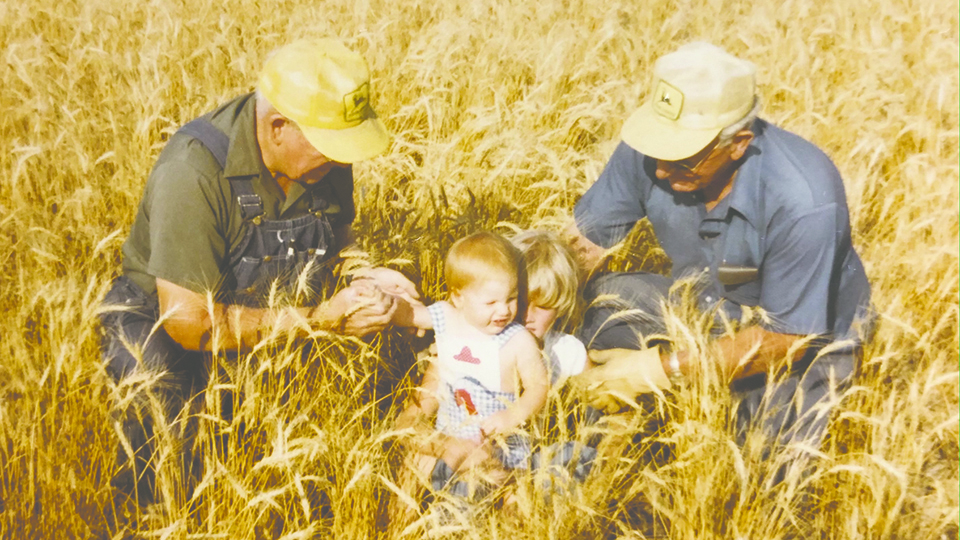Legacy of the land: K-State’s Office for Farm and Ranch Transition to help families pass on their farms to next generation
To a farmer, a field is more than just a simple plot of land.
It’s the ground they have labored over, poured their heart and soul into, to make
things grow. It’s a canvas that tells a story: of crops, harvest time, the changing
of seasons, droughts and storms — times both good and bad. For many, it also represents
a long legacy of local, family-based agriculture, passed on from generation to generation.
“We saw a need to have someone talk about transitioning the farm to the next generation,”
said Ashlee Westerhold, director of K-State’s Office for Farm and Ranch Transition.
This is where K-State’s new Office for Farm and Ranch Transition comes in: to provide
technical assistance both to farmers ready to close out their story and to the next
generation excited to start building their legacy in agriculture.
The Office of Farm and Ranch Transition was established at K-State thanks to a Beginning
Farmer and Rancher Development Program grant through the National Institute of Food
and Agriculture. The Office will serve the agricultural community in three main ways:
- Land link – matching a farmer (with no next-generation parties able to or interested in inheriting the farm) with young aspiring farmers searching for an opportunity.
- One-on-one consultations – meeting with families who have the next generation lined up but are seeking help with the transition period.
- New farmer training – providing educational resources for when the next generation is ready to take over
the farm.
“No matter what your situation looks like, we’re ready to work with you," Westerhold
said. “We’re trying to have a mutually beneficial relationship.”
While Kansas has a number of urban areas like Wichita and Kansas City, a majority
of space in the state is dedicated to family farms, some of which have been operating
for generations.
The Office for Farm and Ranch Transition hopes to promote the state’s agricultural
heritage and honor tradition, keeping the farmland at a family level instead of simply
selling it to large corporations.
“Kansas is a rich agricultural state,” Westerhold said. “It makes this state what
it is.”
She sees the new office as fitting in well with K-State’s land-grant mission of research,
extension and teaching.
“This Office is something that has always been needed — there just hasn’t been dedicated
funds to build it,” she said.
Westerhold’s grandmother and father both grew up on farms, and she’s had a long-time
interest in farm succession. When her grandfather passed away unexpectedly when he
was young, the next generation found that continuing the farm was not financially
feasible. She doesn’t want other families to have to face that same dilemma.
“That’s always been a big passion of mine, to work with these families, to help them
stay in harmony while also protecting the farm as a business,” Westerhold said. “It’s
my dream job.”
She’s already received several phone calls about the land link program from farmers
concerned about their legacy, and she’s also been able to speak at Kansas Farm Management
Association meetings, which have led to one-on-one consultations.
The Office for Farm and Ranch Transition is also poised to start making connections
with current students at K-State, who will make up the next generation of farmers.
The Office will facilitate guest lectures in agricultural economics classes and also
will conduct a special programs course in fall 2023 that is open to all majors called
“Returning to the Farm.” Westerhold wants to make sure students interested in farming
have the business skills now — such as bookkeeping or managing marketing decisions
— that they will need to be successful in the future.
While the agriculture of tomorrow will look very different from the agriculture of
past generations, long-time farmers and ranchers are excited for new technologies
like drones, GPS and data analytics.
Kansas farmers and ranchers are “some of the smartest people I’ve met,” Westerhold
said. “They are willing and ready to adapt. They are very excited about the next generation
having that technology skill set.”
She said the next generation also has a passion for sustainability and regenerative
agriculture — the idea of leaving the land better than you found it. The land was
never yours to begin with — you are a steward, honoring the past, preserving the present
and preparing for the future.
Want to learn more about the work of K-State’s Office for Farm and Ranch Transition?
The office will be hosting conferences across Kansas in December, in Colby, Salina
and Erie.

